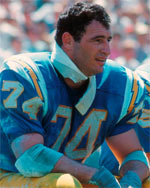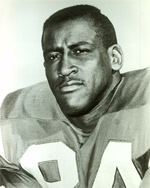Black History Month Seminar - Panel
Ron Mix
Pro Football Hall of Fame tackle Ron Mix (Class of 1979) was one of the most dominant lineman of his era. However, he followed a rather unorthodox road to achieve his football stardom. The most amazing aspect of his story is the fact that he never cared much about football at first. He really wanted to play baseball in high school, and was also fairly successful in track. But, somehow he ended up playing football.
 Ron did well enough in football to earn a scholarship to the University of Southern California. Once he joined the Trojans, he added some weight, became an excellent offensive tackle, and attracted the attention of scouts from both the National Football League (NFL) and the new American Football League (AFL). In 1960, he was drafted by the Boston Patriots (and traded to the Los Angeles Chargers) in the AFL as well as by the NFL’s Baltimore Colts.
Ron did well enough in football to earn a scholarship to the University of Southern California. Once he joined the Trojans, he added some weight, became an excellent offensive tackle, and attracted the attention of scouts from both the National Football League (NFL) and the new American Football League (AFL). In 1960, he was drafted by the Boston Patriots (and traded to the Los Angeles Chargers) in the AFL as well as by the NFL’s Baltimore Colts.
Since the Chargers offered a better contract, Mix opted for the AFL over the NFL. The fact that he would be playing in his hometown was of little consequence because he intended to play only long enough, as he once said, "to get a start in life, just a year or two."
But as his development as a player continued, he realized he enjoyed the game, and decided to stick around. A good student who continued his education and eventually earned a law degree, Ron was nicknamed "The Intellectual Assassin."
He was also a student of the game. On passing plays, he would pop out at his opponent at the moment of the center snap, hit him, drive him back and continue to attack until the pass was in the air. On running plays, his uncanny balance enabled him to take out the defensive end with a chopping block and proceed downfield where he could wipe out the cornerback.
During his 10 years with the Chargers he was reportedly assessed for only two holding penalties. He was an All-AFL selection eight times as a tackle and once as a guard. He also played in eight AFL All-Star games and five of the first six AFL title games. In 1969, he was unanimously chosen for the AFL's All-Time Team.
A major note in his career was when Ron took part in the boycott of the 1965 AFL All-Star game slated to be played at Tulane Stadium in New Orleans following the 1964 season. When African American players, among many other discriminatory reports, were refused service at many of the area businesses, the players successfully lobbied against playing the game in New Orleans and it was eventually moved to Houston.
Ernie Warlick
End Ernie Warlick was already a seasoned veteran when he joined the Buffalo Bills in 1962. That was because the University of North Carolina alum had five years of professional football experience under his belt while playing in the Canadian Football League.
Warlick originally intended to sign with the Los Angeles Rams in 1957, but when he encountered contract difficulties he opted to play in the CFL. While with the Calgary Stampeders from 1957-1961, he was a three-time all-league selection. His remarkable playing style allowed him to amass impressive stats. His total of 150 catches earned him comparisons to Cleveland Browns Pro Football Hall of Fame end Dante Lavelli.
 As such, when he finished out his five-year contract with the Stampeders, six different teams bid for his services. Three of the clubs were from the NFL and three were in the rival AFL.
As such, when he finished out his five-year contract with the Stampeders, six different teams bid for his services. Three of the clubs were from the NFL and three were in the rival AFL.
It was Bills General Manager Dick Gallagher, who would later serve as the Director of the Pro Football Hall of Fame, who successfully wooed the talented end, and signed him to a $12,000 contract.
At 6’4”, 235 pounds, Warlick was affectionately known as “Big Hoss” and had no problem adjusting to play in the rugged AFL. Aside from being an exceptional blocker he had what many believed to be the biggest hands in the sport. That combined with the speed to go deep made his first year in Buffalo a memorable one.
He led the Bills in reception in 1962 with 35 catches for 482 yards and 2 touchdowns. The final 17 grabs occurred in the last three games of the season, courtesy of Bills quarterback Jack Kemp. For his efforts, Warlick was selected to the first of his four AFL-All Star games, one for every season he played in Buffalo.
In 1964 Warlick registered 23 receptions for 478 yards and was an integral member of a Bills squad that earned a 12-2 record and advanced to the AFL championship game. In the title match, Warlick contributed two receptions for 41 yards in the Bills 20-7 victory over the San Diego Chargers.
Warlick later as served as spokesman for the African American players in the boycott of the 1965 AFL All Star game due to the many discriminatory actions at the game’s site in New Orleans.
Warlick’s final season came in 1965 and he went out in style. His final game as a pro was that year’s AFL championship, again against the Chargers. He scored the first TD of the game on a 18-yard pass from Kemp and finished the day with 3 catches for 35 yards and a TD to help give the Bills a second straight AFL title.
Andre Reed's career in photos
Photos from the career of Class of 2013 Finalist Andre Reed.
John Randle's career in photos
Follow the career of Class of 2010 finalist John Randle through photos from the Hall's collection.